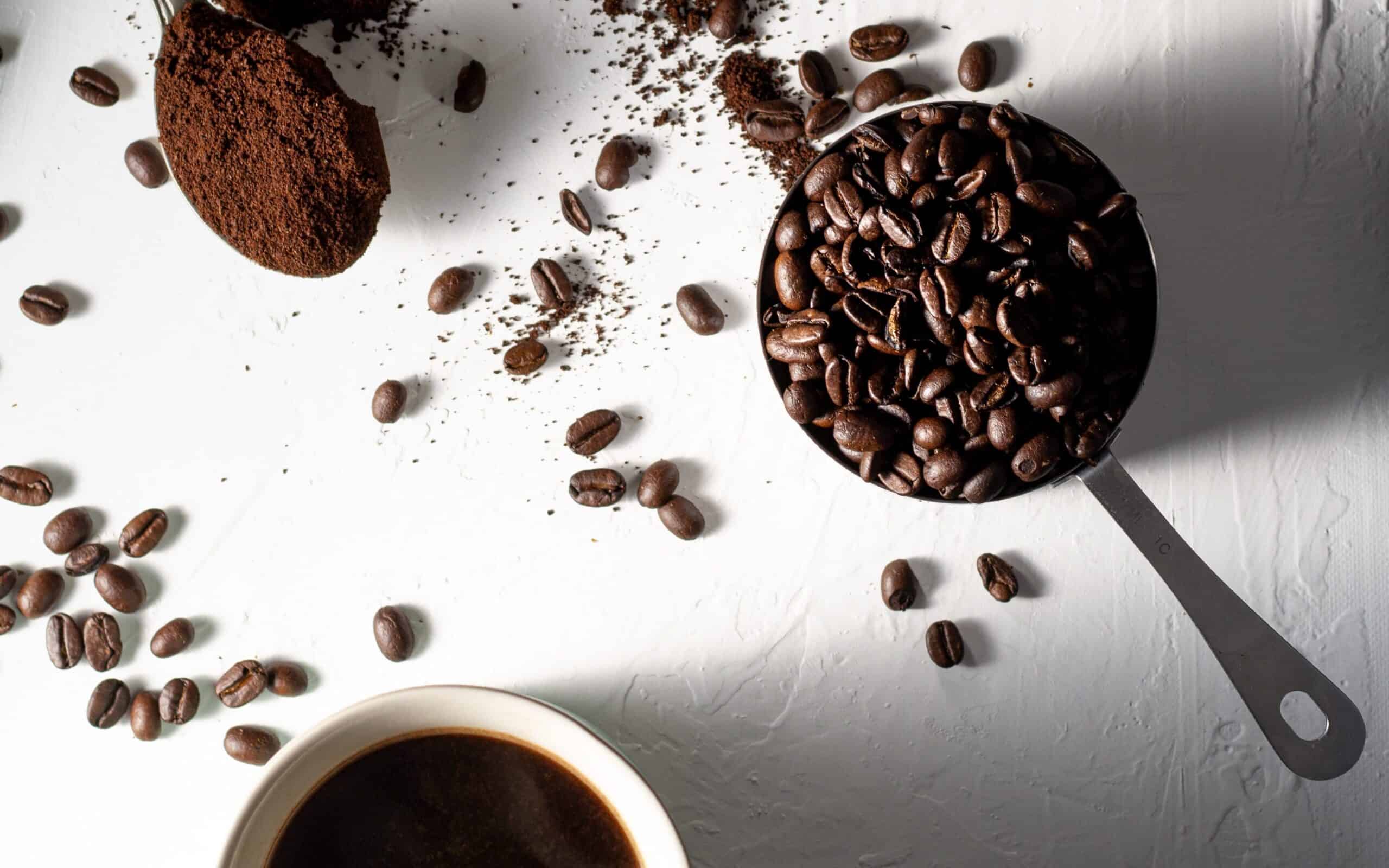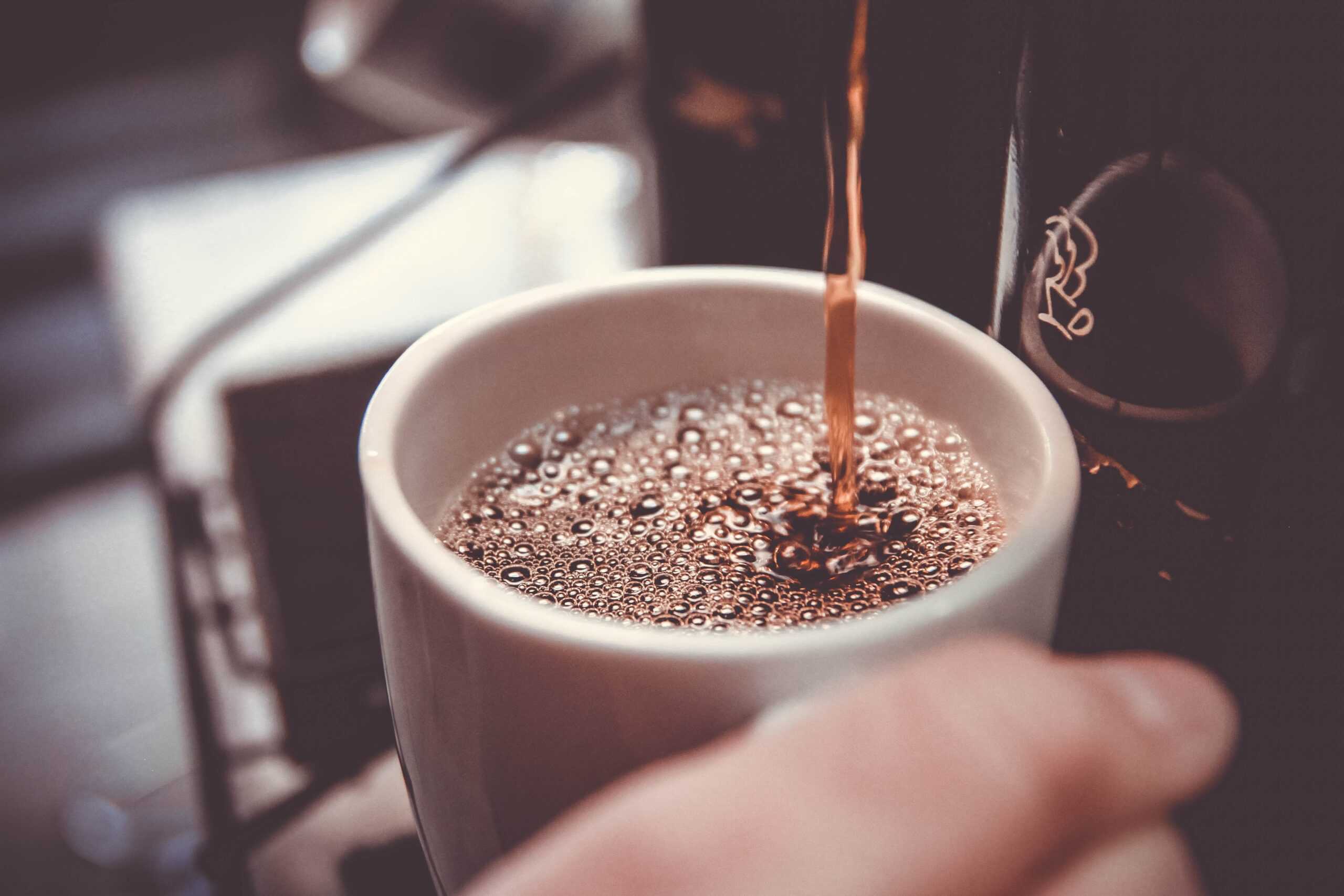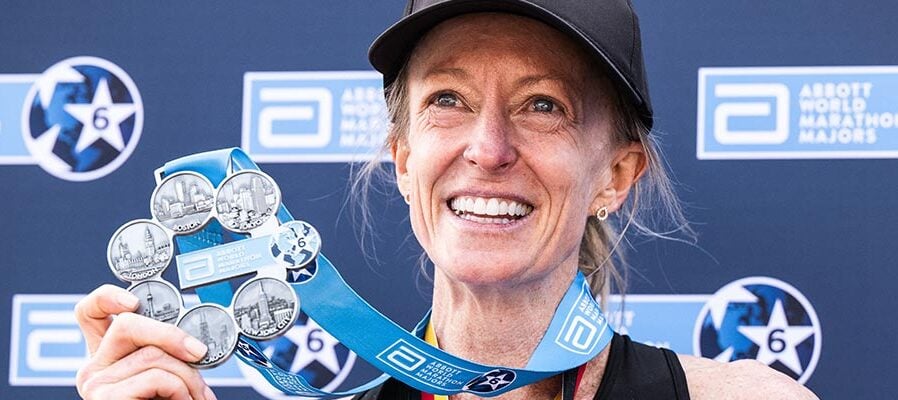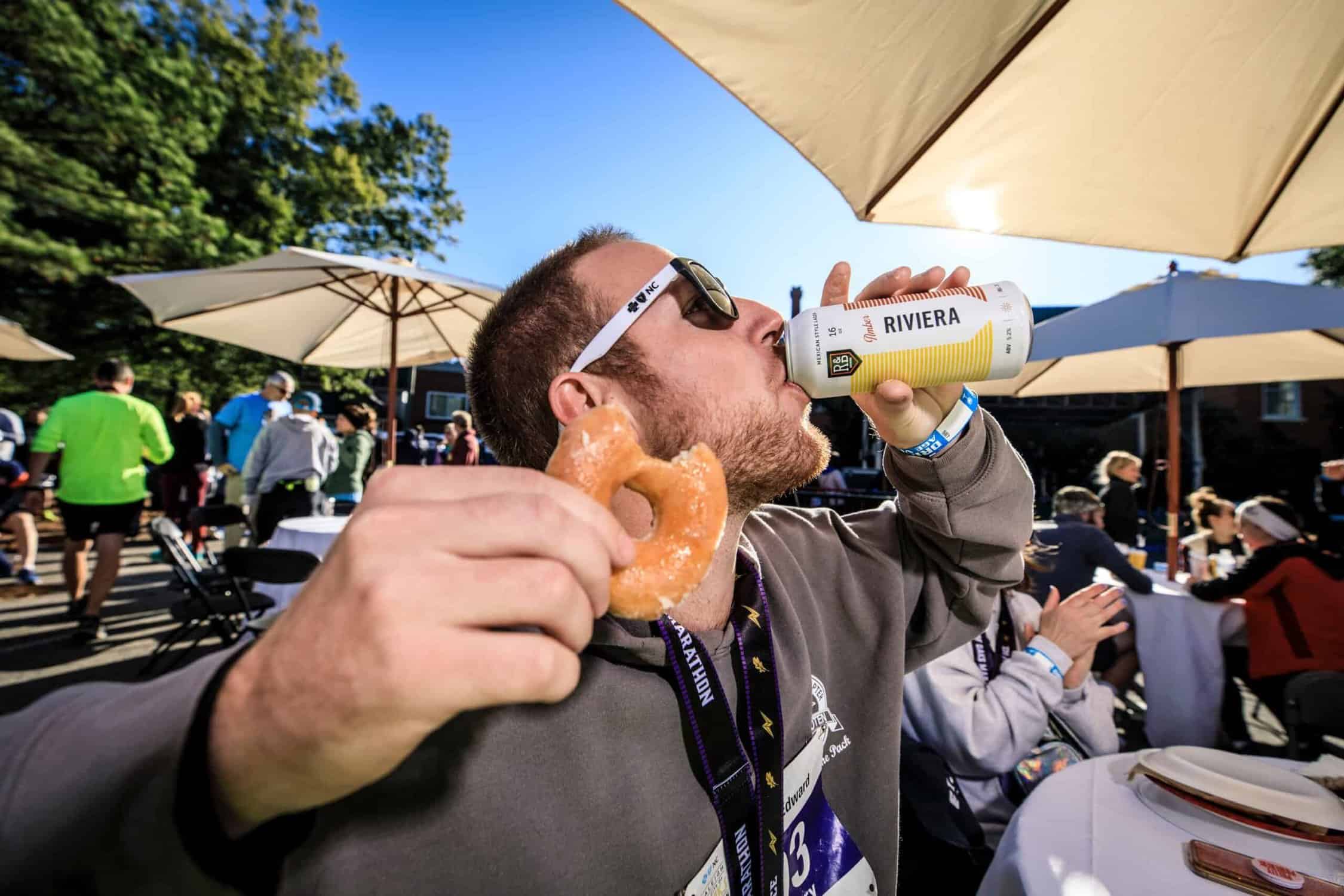If you’re anything like me – there is no chance you are getting a morning run in without a cup of coffee to wake you up. Oftentimes, the morning espresso I make every morning feels truly performance enhancing. In fact, scientific studies have shown that drinking a single cup of coffee before running can have major athletic and health benefits for long-distance runners. However, it is key to get the amount of caffeine, and timing right.
According to one 2021 study, “Caffeine has consistently been shown to improve endurance by 2–4% across dozens of studies…Accordingly, caffeine is one of the most prominent ergogenic aids and is used by athletes and active individuals in a wide variety of sports and activities involving aerobic endurance.”
As both a registered dietitian and an endurance athlete, I’ve studied these reports and have experienced with my clients on how coffee before running can impact performance.
Here’s everything you need to know about coffee before running.

Should I drink coffee before running?
Caffeine is truly one of the most well researched, proven, and widely accepted ergogenic aids available to athletes. In fact, it was found to have such profound effects on athletic performance that it was banned by between 1984 and 2004 by the World Anti-Doping Agency.
Caffeine is a naturally occurring compound found in coffee beans, tea leaves, and chocolate.
Very simply, It works by increasing the body’s production of adrenaline.
An increase in adrenaline in your body will lead to an increase in heart rate. It will increase blood flow to the muscles (circulation) and muscle contractions. These all sound like they might be good for your next long run.
Caffeine’s increase in energy levels may support getting your body ready for intense exercise.
In fact, the International Society of Sports Nutrition states that caffeine has moderate-to-large benefits in aerobic endurance. More so than the benefits you’ll see in activities like weightlifting, sprinting, jumping, and throwing.
The benefits we’re discussing of coffee here are in the benefits of caffeine on performance.
One 8 ounce cup of coffee has between 95 mg and 120 mg of caffeine. If you were averse to the taste of coffee, black tea has between 40 mg and 60mg per cup. A Redbull energy drink has 77mg of caffeine, and a caffeine pill might have over 100 mg of caffeine.
If you are a runner, find and invest into any source of caffeine that works for you.

The Benefits of Coffee for Runners
International guidelines suggest that caffeine consumption improves exercise performance when taken in doses of 1.3-2.7 milligrams of caffeine per pound of body weight.
Any dose above this can produces side-effects and gives no additional ergogenic benefit.
So according to this math, a 160 pound runner would benefit from 208-432 mg of caffeine before a run. For reference, at Starbucks a tall drip coffee contains 260mg, a grande coffee contains 330mg, and a venti contains 457mg. Caffeine pills usually have 100-200mg of caffeine. Healthy adults should generally have a maximum of 400-500mg of caffeine every day.
Some of the benefits of caffeine for runners include:
- Better endurance: Caffeine can improve endurance performance by releasing adrenaline and increasing the oxidation of fatty acids. This spares muscle glycogen stores. This can lead to improved endurance and a delayed time to muscle fatigue. Caffeine has consistently been shown to improve endurance by 2–4% across dozens of studies using doses of 3–6 mg/kg body mass.
- Focus, attention, and mental alertness. Caffeine helps you maintain pace, consistently monitor form, and make rapid strategic decisions during a race.
- Reduced perceptions of pain. Caffeine can reduce your perceived effort and pain during tough races. This will allow you to push harder or endure discomfort for longer.
- Can help you poop before a race. One of the best effects of coffee is its impact on the motor response in the distal colon. When you’re traveling, in a different time zone, eating new foods, or are feeling nervous before a race, try a cup of joe to get things moving.
- Reduced inflammation: The antioxidants in coffee can aid in running recovery from long runs. Since running places stress on muscles and can lead to inflammation and muscle soreness, coffee may have a positive effect on post-run recovery and inflammation.
Downsides of Coffee Before Running
While it has serious benefits for runners, too much caffeine has potential downsides and side effects that need to be considered:
- Gastrointestinal distress: Too much caffeine can lead to nausea, stomach cramps, and diarrhea. Keep in mind that coffee can promote bowel movements. If you down a cup of coffee and start running before you’ve gone for a number two, things could quickly backfire…
- Anxiety, jitters, heart palpitations, high blood pressure: Caffeine is a stimulant. If you’re sensitive to caffeine, you might develop headaches or jitters when you drink coffee. Any of the above symptoms would make a run less comfortable.
- Sleep disruption: Caffeine is known to interfere with sleep, and poor sleep quality can really impact your recovery and running performance. You need adequate rest for optimal training and race preparation. For this reason, avoid taking any caffeine at least less than 6 hours before bed. Do not take caffeine before a run if you are an evening runner.
- Dehydration: Caffeine is a mild diuretic, which means it can increase urine production (meaning, it will make you pee more than you would with the same amount of water) and potentially lead to dehydration if not balanced with adequate fluid intake. Be sure to maintain proper hydration every day if you’re a coffee drinker.

Timing your Caffeine Intake To Improve Running Performance
It will take practice to learn your body and figure out how much coffee (if any!) you should drink before running and the timing of when it works for you.
Before A Run
To improve exercise performance, take 1.3-2.7 milligrams of caffeine per pound of body weight (or 3-6 mg of caffeine per kilogram of body weight) 60 minutes before heading out for a run.
This allows for the caffeine to be digested, absorbed, and delivered to the central nervous system before taking effect.
This can be achieved by drinking one large coffee, or having 2 smaller coffees.
If you’re not a huge coffee drinker, caffeine pills, pre-workout powder, or caffeine gums also have evidence to support their use.
Avoid drinking black coffee on an empty stomach. Caffeine’s effects on energy, performance benefits, and endurance work best when paired with some time of food. Coffee itself does not provide any calories, so take your coffee with easily digestible carbs like a banana, a small energy bar, a piece of toast with jam, or a few handfuls of dry cereal or granola.
Recall that the body relies on carbohydrates for energy during runs.
During A Run
There are unfortunately very few studies that examine repeat caffeine dosing strategies during long races (such as marathons).
As a rule of thumb, if you’re running for more than two hours you should consider taking a source of caffeine in on your run.
Caffeine takes about 20-30 minutes to fully kick in and its effects last for an hour after that.
Given this, when you feel a hint of fatigue onset, heavy muscles, loss of concentration, and pain – take some caffeine. Be proactive about this.
Brands such as GU, Clif, Nuun, Maurten, Precision Hydration and SiS all offer caffeinated electrolyte gel and chew options.
For any of the electrolyte options, the brands will carry both with and without caffeine.
Other Things To Consider About Coffee Before Running
Everyone has a different tolerance for caffeine. Traditionally, you’ll find the impact that coffee has one someone who doesn’t regularly consume caffeine is far greater.
Use your best judgement. The consumption of caffeine is about optimizing performance and, in many cases, performance is best when you’re feeling your best.
Secondly, how you take the caffeine doesn’t matter. I invest heavily into my caffeine set-up. I vouch for the Ninja CFP301 that does a drip coffee, is K-Cup compatible, and has an embedded frother.
Coffees By And For Runners
In case you’re getting into your coffee habit and have been unsatisfied by the coffee you’re finding at your local grocery store, here’s a few brands that were founded by runners. It doesn’t make them any better than a name brand you might recognize like Bulletproof Coffee, but it’s good to celebrate the running community.
- Linden & Two: Founded by American long-distance runner and Olympian, Des Linden.
- Stoked Roasters: Founded by ultramarathoner Jax Mariash.
- Summit Coffee: Founded by 17-time marathon runner Brian Helfrich.
FAQs on Coffee & Running
How long before my run should I drink coffee?
To improve exercise performance, take or 3-6 mg of caffeine per kilogram of body weight 60 minutes before heading out for a run.
Can I drink coffee on an empty stomach before a run?
Avoid drinking black coffee on an empty stomach. Caffeine’s effects on energy, performance benefits, and endurance work best when paired with some time of food. Coffee itself does not provide any calories, so take your coffee with easily digestible carbs like a banana, a small energy bar, a piece of toast with jam, or a few handfuls of dry cereal or granola. Recall that the body relies on carbohydrates for energy during runs.
How do you take caffeine before running?
If you’re not a huge coffee drinker, caffeine pills, pre-workout powder, or caffeine gums have evidence to support their use.
What are the physical effects of caffeine before running?
Caffeine works by increasing the body’s production of adrenaline, increasing your heart rate, blood flow to the muscles, and muscle contractions.
What is the best time of day to drink coffee before running?
The best time of the day to drink coffee before running is the morning. Caffeine is known to interfere with sleep, and poor sleep quality can really impact your recovery and running performance. For this reason, avoid taking any caffeine at least less than 6 hours before bed. Do not take caffeine before a run if you are an evening runner.
How does caffeine affect my running performance?
Caffeine can improve endurance performance by releasing adrenaline and increasing the oxidation of fatty acids, sparing muscle glycogen stores. This can lead to improved endurance and a delayed time to muscle fatigue. Caffeine has consistently been shown to improve endurance by 2–4% across dozens of studies using doses of 3–6 mg/kg body mass.
Should I drink coffee before a run?
International guidelines suggest that caffeine improves exercise performance when consumed in doses of 1.3-2.7 milligrams of caffeine per pound of body weight.
Is coffee before running bad for you?
While it has serious benefits for runners, too much caffeine has potential downsides and side effects that need to be considered such as stomach distress, jitters, and sleep disruption.




